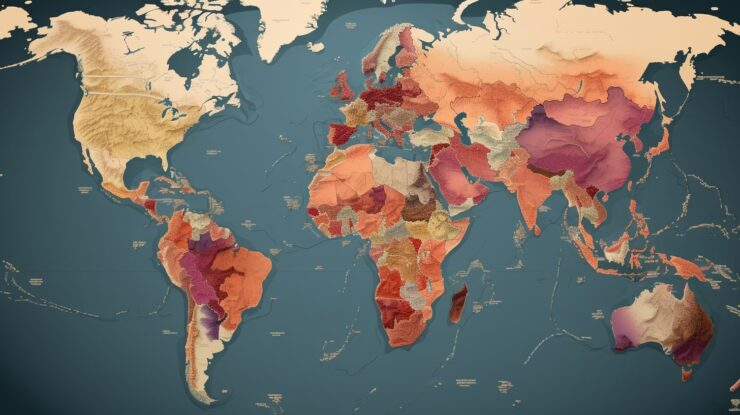Religion, to me, feels like a guiding compass, shaping the way we perceive and engage with the world around us. It’s deeply personal, often molding our core values and moral compass. For many, including myself, religion offers solace, a sense of belonging, and even a purpose in life. The world is home to a myriad of religions, each with its unique beliefs and practices.
Yet, at their heart, I believe most religions converge on two fundamental questions: How should we lead our lives on Earth, and what awaits us after death? Whether it’s a personal spiritual journey, reverence for nature, faith in God as known to Christians, Jews, and Muslims, or devotion to Hindu deities like Vishnu, Shiva, Ganesha, Shakti, and Surya, the essence remains – a quest for understanding and connection.
How Many Religions Are There in the World?
Quantifying the exact number of religions around the globe is a challenging endeavor, and there are several reasons for this complexity. For starters, distinguishing between various religions can be intricate unless one is deeply versed in their teachings. Furthermore, there’s a gray area when it comes to defining what constitutes a separate religion versus a mere denomination or sect.
Take Christianity as an example: while a traditional Mennonite church and a contemporary Vineyard or Assembly of God church may have distinct practices and beliefs, they both fall under the Christian umbrella. On the other hand, Sikhism stands as its own distinct religion, even though some argue it has historical ties to Hinduism.
Similarly, the boundary between a spiritual experience that isn’t tied to a specific religion and an established religious belief can be blurry. Practices like New Age, Wicca, or even certain yoga traditions might be viewed as religious by some individuals and merely spiritual by others. A commonly cited estimate suggests there are around 4,000 to 4,300 religions globally.
However, this figure is contentious. It encompasses ancient belief systems no longer in practice and also counts individual denominations within a religion as separate entities. So, Christianity wouldn’t be seen as a singular religion but would be divided into its many branches like Protestant, Catholic, Lutheran, and so forth.

World Population by Religion
In my observation, around 85% of the global population finds solace and identity in religious beliefs. Christianity stands out as the most embraced faith, with a staggering 2.38 billion souls finding comfort in its teachings. Islam, with its profound spiritual depth, resonates with over 1.91 billion people, and it’s fascinating to think that by 2050, its followers might rival the number of Christians.
Diverse and rich in culture, Hinduism, Buddhism, and Judaism collectively captivate billions. There are also “folk religions” that beautifully encapsulate the traditions of Africa, the indigenous beliefs of America and Australia, and the ancient practices of China. Another intriguing category is “other religions,” which encompasses lesser-known but equally profound faiths like Shintoism, Taoism, Sikhism, and Jainism.
And then, there’s a vast sea of individuals, nearly 1.2 billion, who either tread their own spiritual path without affiliating with established religions or embrace atheism. Here’s a personal reflection on the numbers for 2020:
- Christianity: A faith of love and hope with 2.38 billion believers.
- Islam: A path of devotion followed by 1.91 billion.
- Hinduism: A tapestry of deities and rituals embraced by 1.16 billion.
- Buddhism: A journey towards enlightenment for 507 million.
- Folk Religions: A celebration of ancestral traditions by 430 million.
- Other Religions: Diverse and unique, followed by 61 million.
- Judaism: An ancient covenant cherished by 14.6 million.
- Unaffiliated: A vast group of 1.19 billion, each with their own story to tell.
Christianity

Christianity, with its vast following of nearly 2.4 billion believers, stands as the world’s predominant religion. It’s fascinating to see the rich tapestry of Christian beliefs, branching into Eastern and Western theologies and further subdividing into myriad denominations like Catholicism, Protestantism, and Eastern Orthodoxy.
From Baptists to Lutherans, Methodists to Mormons, the diversity is astounding. It’s heartwarming to think of places like Vatican City and the Pitcairn Islands where every single soul identifies as Christian. And in nations like Greece, Malta, and Romania, the Christian spirit is overwhelmingly present.
Islam

Islam, revered by billions, is the second most widespread faith. Muslims, as its followers are known, form the majority in countries like the Maldives, Mauritania, and Saudi Arabia.
From the Sunni heartlands of Algeria and Tunisia to the Shi’a strongholds of Iran and Iraq, the Islamic faith is deeply rooted. It’s incredible to think there are 50 nations where Muslims are in the majority.
Hinduism

Hinduism, more than just a religion, is a way of life for many. Originating from the Indian subcontinent, its influence has spread across Southeast Asia.
With its diverse denominations like Vaishnavism and Shaivism, it’s the heartbeat of nations like India and Nepal. While India boasts the largest number of Hindus, it’s Nepal that has the highest percentage.
Buddhism

The teachings of Buddha, originating from India, have found resonance with over half a billion souls. Countries like China, Thailand, and Myanmar are home to vast Buddhist populations.
The essence of reincarnation and the quest for enlightenment are central to this faith. It’s awe-inspiring to see countries like Cambodia where almost the entire population identifies as Buddhist.
Other Religions
The spiritual landscape is also adorned with traditional Chinese beliefs like Confucianism and Taoism, especially prevalent in regions like Hong Kong and Taiwan.
Then there are the indigenous beliefs, deeply rooted in the cultures of nations like Guinea-Bissau and Haiti. These faiths, though lesser-known, are equally profound.
Unaffiliated or Atheist

And of course, there’s a significant portion of humanity that either doesn’t affiliate with any religion or identifies as atheist. Countries like Estonia, China, and Japan have vast populations that don’t adhere to religious practices. It’s a testament to the diverse ways in which humans seek meaning and purpose in life.
FAQs
Which religion is highest in 2024?
Christianity remains the world’s largest religion in 2024, with almost 2.4 billion adherents.
Which religion will be biggest in 2050?
Population researchers predict that Islam will nearly catch up to Christianity by 2050, suggesting a close competition between the two.
How many religions are there in 2024?
Determining an exact number remains challenging due to the nuances between religions and denominations. However, a popular estimate suggests there are between 4000-4300 religions, though this includes extinct belief systems and counts denominations separately.
How many Muslims are in the world in 2024?
Islam is practiced by more than 1.91 billion people as of the last known data from 2020. The number is likely higher in 2024, but specific figures would require up-to-date research.
Why is Islam increasing?
The growth of Islam can be attributed to a combination of factors including higher birth rates in Muslim-majority countries, conversions, and the spread of Islamic teachings and culture.
What will be the world religion in 2070?
Predictions suggest that Islam might surpass Christianity in terms of global adherents by 2070 due to its rapid growth rate.
What will be the largest religions by 2100?
Current trends indicate that Islam and Christianity will continue to be the dominant religions by 2100, with Islam potentially having a slight edge.
What will be the largest religion in the world in 2060?
By 2060, Islam is projected to be on par with, if not slightly surpassing, Christianity in terms of global followers.
Is Christianity growing in the world?
Christianity continues to grow, especially in regions like Africa. However, its growth rate is slower compared to Islam, particularly in terms of global percentages.
Final Words
Religion, in its myriad forms, has been a cornerstone of human civilization, guiding our moral compass, shaping societies, and offering solace in times of despair. As we journey through the 21st century, it’s evident that while the religious landscape is evolving, the human quest for spiritual understanding and connection remains constant.
Whether through ancient rituals or modern interpretations, the essence of faith continues to bind humanity in a shared pursuit of purpose and meaning.












